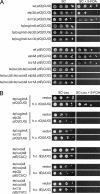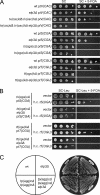Eukaryotic wobble uridine modifications promote a functionally redundant decoding system
- PMID: 18332122
- PMCID: PMC2423140
- DOI: 10.1128/MCB.01542-07
Eukaryotic wobble uridine modifications promote a functionally redundant decoding system
Abstract
The translational decoding properties of tRNAs are modulated by naturally occurring modifications of their nucleosides. Uridines located at the wobble position (nucleoside 34 [U(34)]) in eukaryotic cytoplasmic tRNAs often harbor a 5-methoxycarbonylmethyl (mcm(5)) or a 5-carbamoylmethyl (ncm(5)) side chain and sometimes an additional 2-thio (s(2)) or 2'-O-methyl group. Although a variety of models explaining the role of these modifications have been put forth, their in vivo functions have not been defined. In this study, we utilized recently characterized modification-deficient Saccharomyces cerevisiae cells to test the wobble rules in vivo. We show that mcm(5) and ncm(5) side chains promote decoding of G-ending codons and that concurrent mcm(5) and s(2) groups improve reading of both A- and G-ending codons. Moreover, the observation that the mcm(5)U(34)- and some ncm(5)U(34)-containing tRNAs efficiently read G-ending codons challenges the notion that eukaryotes do not use U-G wobbling.
Figures







Similar articles
-
Elongator-a tRNA modifying complex that promotes efficient translational decoding.Biochim Biophys Acta Gene Regul Mech. 2018 Apr;1861(4):401-408. doi: 10.1016/j.bbagrm.2017.11.006. Epub 2017 Nov 21. Biochim Biophys Acta Gene Regul Mech. 2018. PMID: 29170010 Review.
-
The role of wobble uridine modifications in +1 translational frameshifting in eukaryotes.Nucleic Acids Res. 2015 Oct 30;43(19):9489-99. doi: 10.1093/nar/gkv832. Epub 2015 Aug 17. Nucleic Acids Res. 2015. PMID: 26283182 Free PMC article.
-
Roles of 5-substituents of tRNA wobble uridines in the recognition of purine-ending codons.Nucleic Acids Res. 2003 Nov 15;31(22):6383-91. doi: 10.1093/nar/gkg839. Nucleic Acids Res. 2003. PMID: 14602896 Free PMC article.
-
Unexpected accumulation of ncm(5)U and ncm(5)S(2) (U) in a trm9 mutant suggests an additional step in the synthesis of mcm(5)U and mcm(5)S(2)U.PLoS One. 2011;6(6):e20783. doi: 10.1371/journal.pone.0020783. Epub 2011 Jun 7. PLoS One. 2011. PMID: 21687733 Free PMC article.
-
Decoding the genome: a modified view.Nucleic Acids Res. 2004 Jan 9;32(1):223-38. doi: 10.1093/nar/gkh185. Print 2004. Nucleic Acids Res. 2004. PMID: 14715921 Free PMC article. Review.
Cited by
-
Rectifier of aberrant mRNA splicing recovers tRNA modification in familial dysautonomia.Proc Natl Acad Sci U S A. 2015 Mar 3;112(9):2764-9. doi: 10.1073/pnas.1415525112. Epub 2015 Feb 9. Proc Natl Acad Sci U S A. 2015. PMID: 25675486 Free PMC article.
-
Plant Elongator-Protein Complex of Diverse Activities Regulates Growth, Development, and Immune Responses.Int J Mol Sci. 2020 Sep 22;21(18):6912. doi: 10.3390/ijms21186912. Int J Mol Sci. 2020. PMID: 32971769 Free PMC article. Review.
-
Roles of Elongator Dependent tRNA Modification Pathways in Neurodegeneration and Cancer.Genes (Basel). 2018 Dec 28;10(1):19. doi: 10.3390/genes10010019. Genes (Basel). 2018. PMID: 30597914 Free PMC article. Review.
-
Abundances of transfer RNA modifications and transcriptional levels of tRNA-modifying enzymes are sex-associated in mosquitoes.Insect Biochem Mol Biol. 2022 Apr;143:103741. doi: 10.1016/j.ibmb.2022.103741. Epub 2022 Feb 16. Insect Biochem Mol Biol. 2022. PMID: 35181477 Free PMC article.
-
Data-Independent Acquisition for the Detection of Mononucleoside RNA Modifications by Mass Spectrometry.J Am Soc Mass Spectrom. 2022 May 4;33(5):885-893. doi: 10.1021/jasms.2c00065. Epub 2022 Mar 31. J Am Soc Mass Spectrom. 2022. PMID: 35357823 Free PMC article.
References
-
- Agris, P. F. 1991. Wobble position modified nucleosides evolved to select transfer RNA codon recognition: a modified-wobble hypothesis. Biochimie 731345-1349. - PubMed
-
- Ausubel, F. M., R. Brent, R. E. Kingston, D. D. Moore, J. G. Seidman, J. A. Smith, and K. Struhl (ed.). 2001. Current protocols in molecular biology. John Wiley and Sons, Inc., New York, NY.
-
- Boeke, J. D., F. LaCroute, and G. R. Fink. 1984. A positive selection for mutants lacking orotidine-5′-phosphate decarboxylase activity in yeast: 5-fluoro-orotic acid resistance. Mol. Gen. Genet. 197345-346. - PubMed
Publication types
MeSH terms
Substances
LinkOut - more resources
Full Text Sources
Molecular Biology Databases
